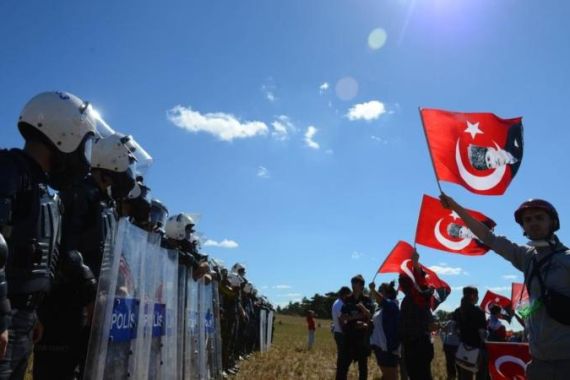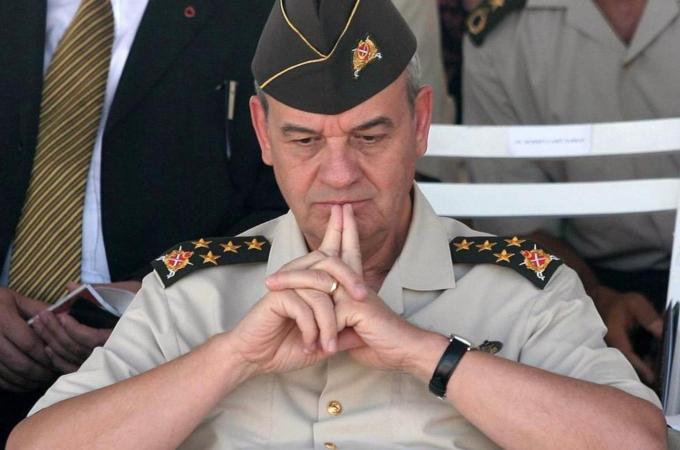Analysis: Turkey’s divisive Ergenekon trial
Conviction of alleged coup plotters seen by many as Islamists’ revenge against the army.

Istanbul, Turkey – On August 5, 2013, a court in Silivri, a small town outside of Istanbul, sentenced 19 current and former military officers to life in prison after finding them guilty of being part of a cadre that aimed to overthrow Turkey’s ruling Justice and Development Party (AKP).
The group, named Ergenekon after a mythical Central Asian valley connected to Turkish nationalist lore, was described as consisting of members of the armed forces and civilians in the media, academia, and opposition political parties. They were accused of being part of a secret “deep state” and were said to view themselves as the protectors of Turkey’s national identity and the secular values of the country’s founder, Mustafa Kemal Ataturk.
With an oft-stated aim to fulfill this role as guardians of secularism in the country, the Turkish military has toppled four governments since 1960.
The Islamist AKP has proven itself the only force so far able to take on this deep state and survive. The trial lasted five years and grew to include 275 defendants. Only 21 were acquitted. Most observers do not doubt that many of the defendants were guilty of crimes. But the evidence presented to the court was so scant, and the arrests so far-ranging, that a trial aiming to advance democratic practices in Turkey ended up creating more questions than answers.
|
|
| Clashes erupt after Turkey trial verdicts |
The case began in June 2007, when police were tipped off about a stash of 27 grenades buried in the Istanbul district of Umraniye. Arrests of active and retired military officers and civilians sympathetic to the opposition quickly followed. A military plot allegedly named “Sledgehammer” was then discovered that aimed to create chaos inside Turkey to justify a coup d’etat against the popular AKP, which had won multiple elections and were rumoured to have a long-term plan to “Islamise” Turkey.
The Ergenekon trial eventually grew to include 23 other cases, including a 2006 shooting of a judge at Turkey’s Council of State building, and other unsolved cases linked to the organisation. The current and former military officers were also individually charged with criminal acts, which involved extrajudicial killings and links to Turkey’s criminal underworld.
Large segments of society saw the trial as a way to come to terms with Turkey’s violent past. But supporters of the defendants claimed that Prime Minister Recep Tayyip Erdogan and the Gulen Movement, an international Turkish Islamic group that threw its weight behind the AKP in several elections, used the case as an excuse to do away with opposition.
The trial process
The trial began in 2008 with the first of four indictments submitted to a special court in Silivri. Detainments and arrests continued simultaneously.
Seckin Albayram, a lawyer for one of the defendants, described a process that was far from the basic principles of the right to a fair trial. Twenty-three cases were merged together and there were four million pages of documents, far too many to be read properly. The people accused of holding leadership positions in Ergenekon were only allowed to present a two-hour defence. Those accused of general membership were only allowed 30 minutes to present their defence.
“These durations include the time that was used by them and their lawyers together,” Albayram said.
I believe the Ergenekon case and trial gives an end to the coup d'etat culture in Turkey... It sends a very strong message to any person who may be planning or wishing to stage a coup d'etat.
At times, Albayram explained, faulty evidence was presented. For instance, an Air Force officer named Ali Celebi had his phone confiscated by the police. Later, 139 contacts were found to have been loaded into the phone and presented as evidence. It was later proven that at the time the contacts were entered, the phone was in the possession of the police. Albayram said the police claimed this was a mistake.
In another incident, one of the defendants, Osman Yildirim, turned out to be one of the prosecution’s secret witnesses, an event reported by many Turkish newspapers.
Albayram added that lawyers such as himself needed to travel about 100 kilometres from Istanbul to Silivri to attend the hearings and meet with detained clients. This used up time he could have spent preparing for the trial if it had been held in Istanbul.
But Atilla Yesilada, a political analyst with Istanbul’s Global Source Partners, explained that the court functioned essentially as a military tribunal. It was thus legally permitted to use secret witnesses, and the defence was not allowed to see certain evidence.
He said the Silivri court was essentially an evolution of the “terror courts” used in Turkey during the conflict-wracked 1980s and 1990s, which were granted many special powers.
Human Rights lawyer Orhan Kemal Cengiz said he supported the trial, though admitted the judicial process was not without its shortcomings. “We know that some of them were responsible for mass human rights violations, especially in the southeast of Turkey,” he said.
Secret evidence and anonymous witnesses were allowed under Turkey’s “terror laws”, if the witnesses’ lives were deemed to be at risk. “When I look at the Ergenekon trial from this perspective, I can see some witnesses were qualified in this sense to be given the status of secret witnesses,” he said.
“Five, six years ago we couldn’t imagine that military personnel would appear before civilian courts and give an account for what they had done,” Cengiz said. He described the case’s legal shortcomings as “not unique to Ergenekon”, but a byproduct of Turkey’s faulty legal system.
“I believe the Ergenekon case and trial gives an end to the coup d’etat culture in Turkey,” he said. “It sends a very strong message to any person who may be planning or wishing to stage a coup d’etat.”
A ‘broad witch hunt’
The number of arrests accelerated towards the end of 2010. “In the first stages of prosecution, there was much support for the trials,” said Cengiz Candar, a noted Turkish political commentator and journalist. “But later on, the number of defendants extended so much it included scores of people. The conduct of the trial indicated a number of violations of basic principles of justice and there was a lot of foul play involved.”
The mass arrests began to draw more criticism, both domestically and internationally. A breaking point was the March 2011 detainment of investigative journalist Ahmet Sik. He was charged with being a member of Ergenekon’s propaganda wing, despite the fact that he spent much of his professional life uncovering the organisation.
However, at the time of his arrest, he was preparing to publish a book on the Gulen Movement’s infiltration of the police force. Authorities confiscated copies of the manuscript and it was banned. He was released a year later.
 |
| Former Army Chief of Staff Ilker Basbug was sentenced to life in prison [AFP] |
The trial became “a broad witch hunt, a complete elimination of anyone who spoke against the Ergenekon case or the Gulen community”, said Yesilada.
Then, in a surprise move, the main prosecutor, Zekeriya Oz, who was considered to be close to the Gulen Movement, was removed from the case and reassigned by the Supreme Board of Judges and Prosecutors. The move appeared to have been backed by the AKP, which established control over the board for the first time after a 2010 constitutional referendum.
It was believed that Oz was considered by the government to be too aggressive, and the reassignment was meant to rein him in before the trial was completely discredited.
The next major breaking point occurred when Ilker Basbug, the chief of the armed forces between 2008 and 2010, was detained on charges of being involved in a plan to establish various websites meant to discredit the AKP.
“The evidence on Basbug never has been very satisfactory for me,” said Henri Barkey, a Turkey expert at Lehigh University in Pennsylvania.
But detaining such a senior officer signalled only one thing: no-one in Turkey’s military was untouchable. For the first time since the foundation of the Turkish Republic in 1923, civilians ruled the military.
Democratic principles
After the sentencing, AKP officials claimed a major victory.
“Today, it has been officially accepted that Ergenekon was a terrorist organisation,” said Egemen Bagis, Turkey’s EU minister. “We as a nation are seeing a historic day in the name of democracy and the rule of law.
People who don't vote for the AKP are unanimous that Ergenekon was not justice, it was revenge.
Deputy Prime Minister Bulent Arinc agreed. “Nobody has the privilege of committing crimes,” he said. “We are not people who are going to be happy about anybody’s arrest. But there is a court ruling and everyone should respect it. I consider the criticism from suspects and their relatives as emotional.”
Many people who believed the military needed to face justice also believed the sweeping arrests and handling of the judicial process fatally tainted the trial. “People who don’t vote for the AKP are unanimous that Ergenekon was not justice, it was revenge,” Yesilada said, a reference to how Islamist groups suffered when the military was in power.
The decisive moment in civilian-military relations came before the Ergenekon trial even began, said Barkey. In 2007, the military tried to block the candidacy of Abdullah Gul, the AKP’s choice for president, believing him to be too religious. Instead of acquiescing, the AKP called for early elections and won with 47 percent of the vote, a clear sign of the country’s support.
Afterwards, the Ergenekon trial was meant to “bury the military once and for all”, Barkey said, “to make sure the military never thinks about intervening again”.
While it likely existed to some degree, there was little evidence of political interference in the judicial process, Barkey said. The real issue, according to him, was the functioning of Turkey’s judiciary itself.
“You get sentenced because of who you are, not what you have done,” he said. “The Turkish judicial system is arbitrary and political.”
Follow Justin Vela on Twitter: @justinvela